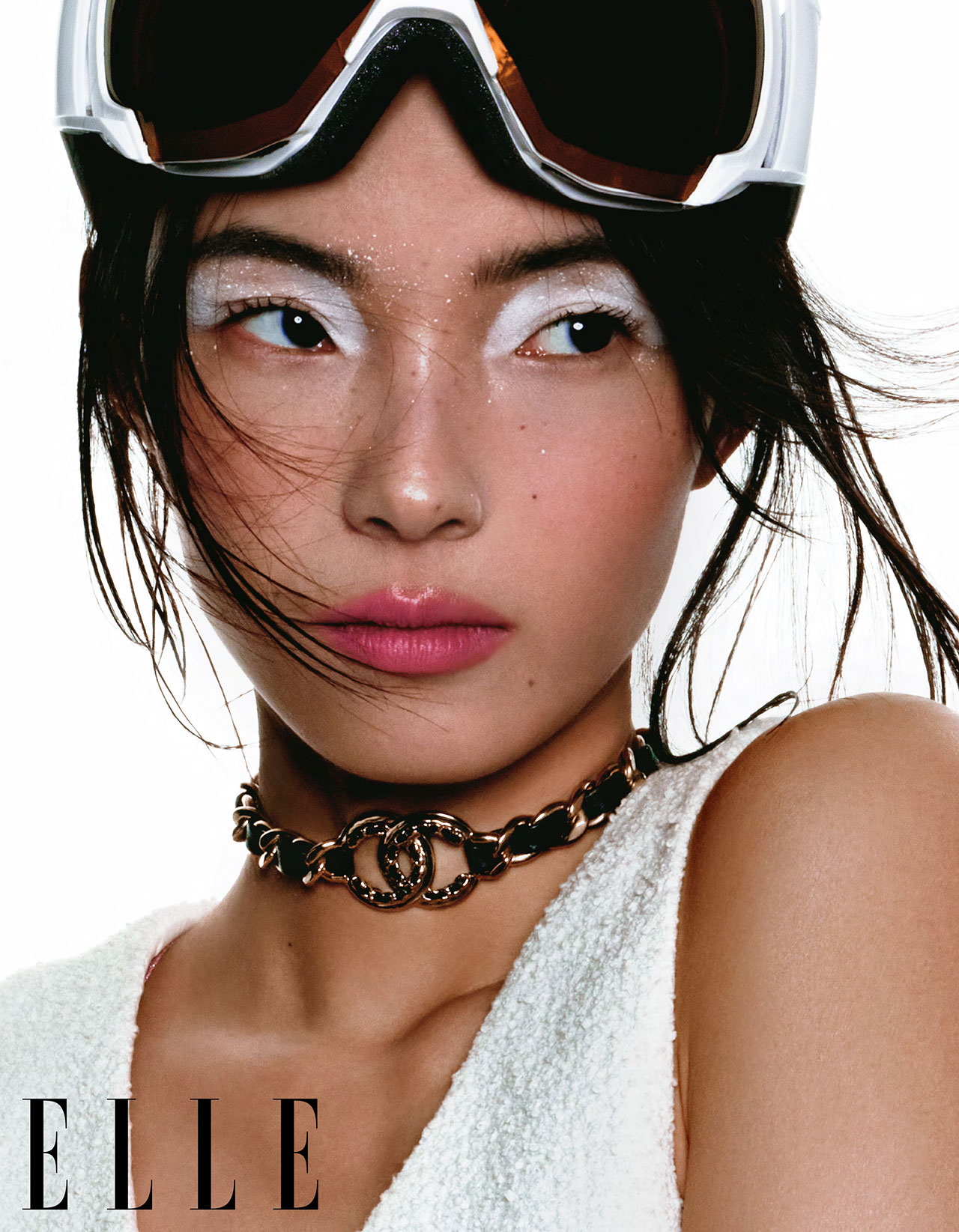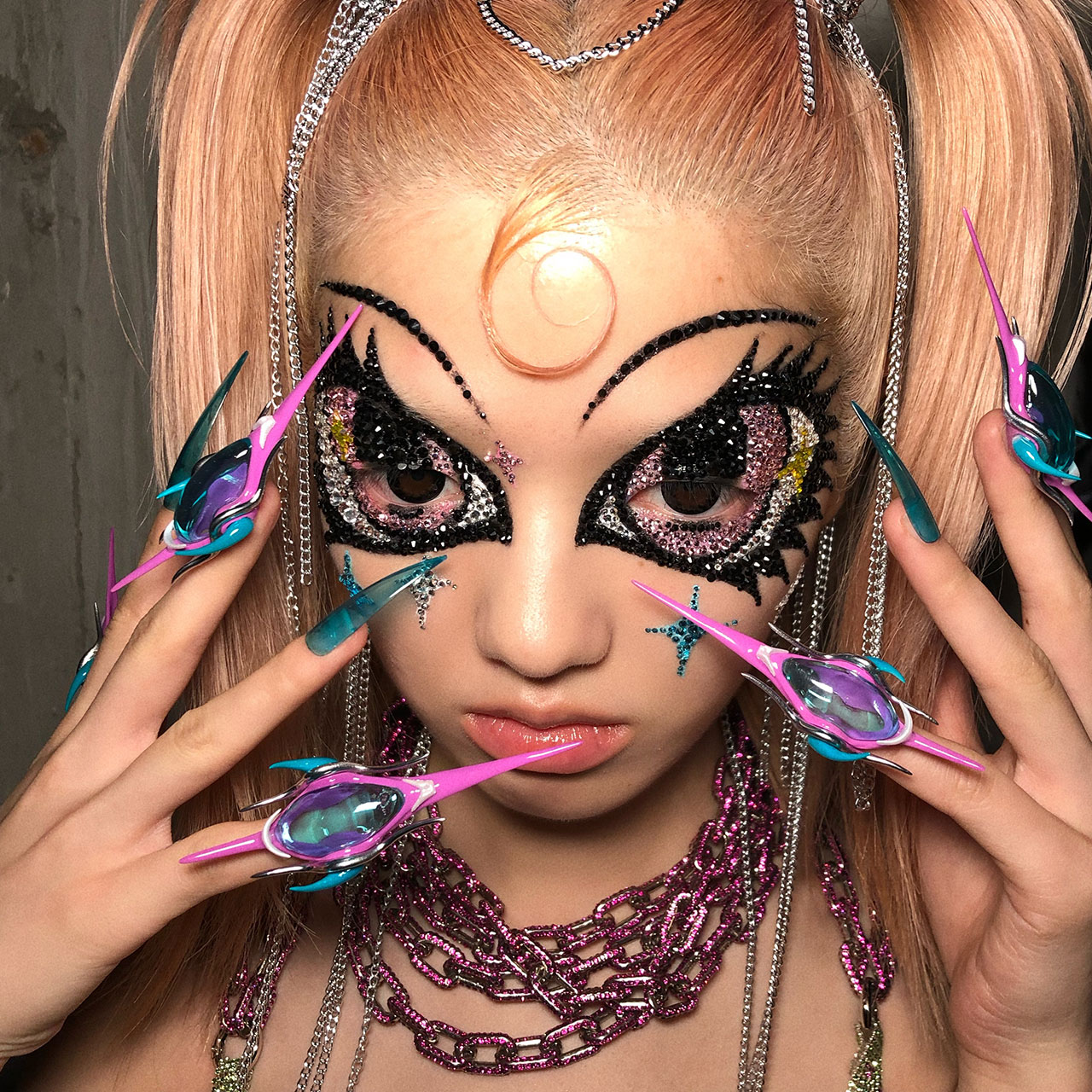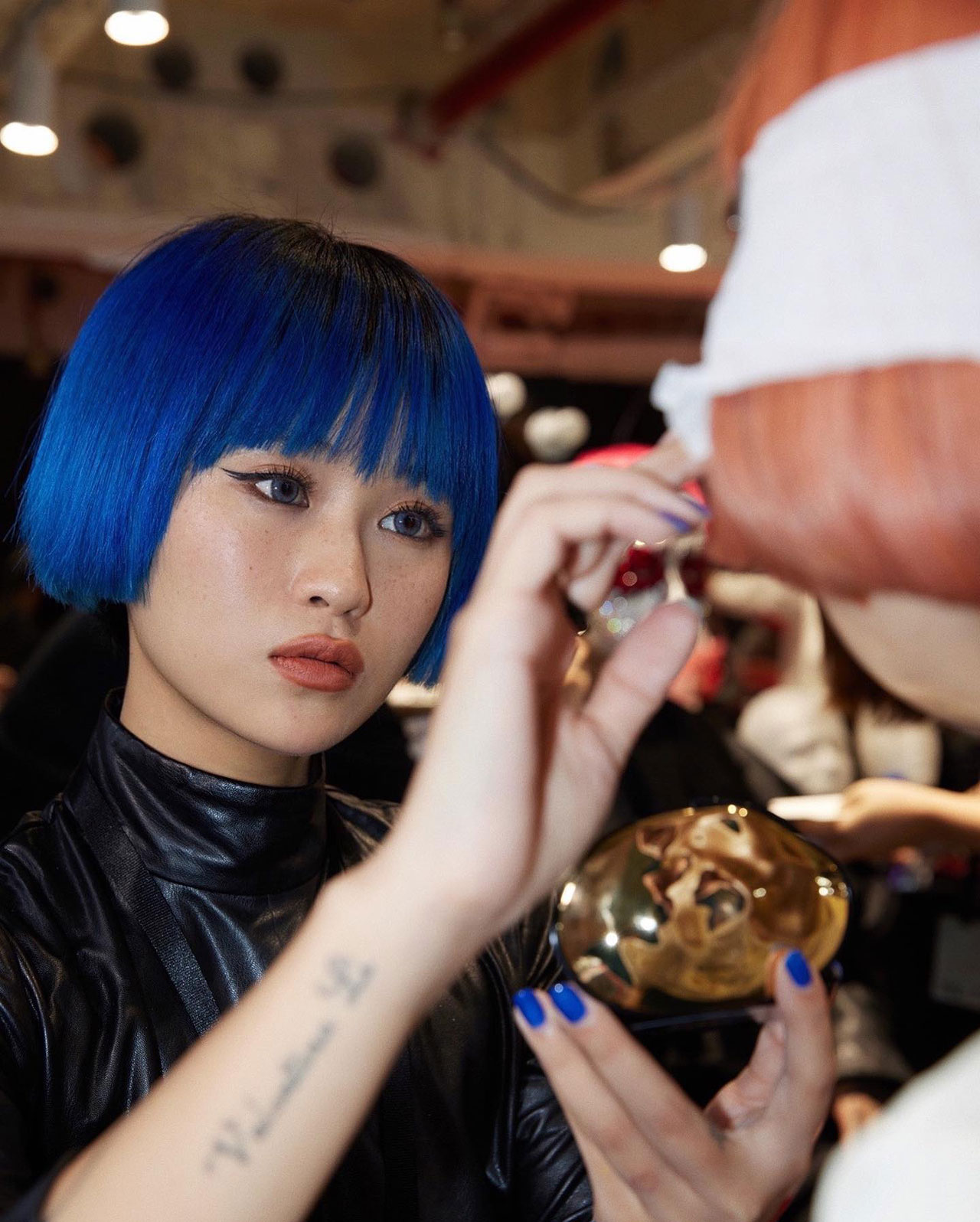Growing up in a small town in Guangxi, China, face-painter Valentina Li didn’t have that many forms of entertainment. A developed love for nature and painting naturally led to a desire to be a biologist or cartoonist as a child. Fast-forward years later Li went on a different path studying journalism at university but after stumbling upon a cosplay club, she discovered that her true passion was makeup. “I felt alive and full of energy in a way that journalism didn’t make me feel. After that, I never looked back.” Li has gone on to work with American, British, and Vogue China editions, Prada, and more clients in search of her exuberantly, bold style. Models.com spoke to the manga enthusiast about her differentiation between a makeup artist and face painter, her inspirations, and how she’s keeping busy during the lockdown in Shanghai.

Photo by Leslie Zhang | Image courtesy of Valentina Li
What pushed your transition from being a journalist into a face painter?
My major in college was journalism, but I went to Paris to study makeup. I initially did freelance writing about Paris Fashion Week for Chinese publications. Even though I had chosen journalism as my major in college, I never really developed a passion for it. I grew up in a small town in Guangxi, China where we didn’t have the conditions for a little girl to believe she could pursue whatever career she wanted. I think that’s why it took some time for me to find my passion in life. Without many other forms of entertainment available, I spent most of my childhood painting and exploring nature. My first encounter with makeup was when I joined my college’s cosplay club. I was immediately fascinated by makeup and found it even more fun than painting. I loved its power to transform – not just a face but a whole personality. Each face was a blank page and a source of inspiration at the same time. I felt alive and full of energy in a way that journalism didn’t make me feel. After that, I never looked back, even though I’m grateful for the industry insight I got from those early jobs as a fashion writer.
How has your editorial background influenced how you approach beauty?
One thing I learned from journalism is the importance of research. You have to understand the history and the background of a project to get beneath surface appearances. I guess my approach to beauty takes all of that into consideration.

Photo by Nick Yang | Image courtesy of Valentina Li
You recently worked alongside Leslie Zhang for Wallpaper China’s April covers. How was it like collaborating with him again?
It’s always a pleasure to work with Leslie. I appreciate his aesthetics and vision. It’s effortless to communicate with him, and he always gives us the room to create. For the April Wallpaper cover, we went to the coastal city of Quanzhou to explore the local “fish women” culture. It was a massive challenge for everyone working in the extreme weather conditions, but the result of the team’s work was amazing, we were able to tell a traditional story in a modern way.
You’ve mentioned that you’re a big fan of Manga and even created this look for the Linlin Chasse campaign, shot by Leslie Zhang. What else are you inspired by, and how do you incorporate it into your work?
Yes, I’m a massive fan of manga. I dreamed of becoming a cartoonist when I was young, but I also dreamed of studying the natural world as a biologist. I guess everyone is full of dreams when they’re young. I grew up in a mountainous region, far away from city life, so nature is my biggest inspiration. The color combinations in the forest and ocean never cease to amaze me. Nature is the true Master of Color. I also love sci-fi movies and mystery novels (some favorites are Alien, The Cell, and Back to the Future). I also draw inspiration from the Dutch painter Hieronymus Bosch — the worlds he painted frequently appear in my dreams. Makeup requires experimentation, so when I have a complicated idea, I often draw it on paper and then try it on myself to see if it works. I like to play around with complex ideas in my free time, it helps me simplify the concepts when I’m working and the results are usually quite satisfying.

Photo by Valentina Li | Image courtesy of Valentina Li
Shanghai, where you’re based, is currently on lockdown. How have you been keeping creative, and have you been experimenting with any makeup looks?
The lockdown in Shanghai was unexpected, but I see it as a time for me to refresh myself and rethink things. I have plenty of time to watch movies, read, and research my favorite topics — outer space, the deep ocean, insects, etc. I try to stay positive and am planning to record some makeup videos. So far, the lockdown situation is pretty bad, it’s not easy to order food, and everything is kind of paused. Nevertheless, I still see it as an opportunity for creative exploration.
You’ve made it clear that you are a face painter and not a makeup artist. What are the differences between the two to you?
In the past, I objected to being called an “artist,” which I aspire to be someday, but I don’t object to the title “makeup artist.” It’s kind of funny you asked this, though. I have an official certificate as a makeup artist from the Chinese government, and from that certificate, I found makeup artists are officially categorized as a type of “technician.” The truth is I don’t just do makeup, I also create nail art, body painting, and sculpting using my materials. I also like the romance of the term “face painter” and want to connect myself to that tradition.

Photo by Win Tam | Image courtesy of Valentina Li
Your work often includes jewels, glitter, and even flowers on talents. What are some of your favorite materials to work with, and why?
I love any material I can put on a face to create something new. I’m still in the process of exploring different materials. 3D printing is trendy now but I’m a bit old-school in that I like to make everything by hand. I also want to keep exploring this interest through a small foray into sculpting: I’ve finished three pieces. This project is closely related to my makeup work, so I’m really excited to see where it will take me.
How does face painting empower you?
I find it empowering as a form of expression. Face painting is my little way to make statements about the world and social issues. I want to show that transformation is possible in many different ways. I don’t like to be too direct, though. I want the audience to look beneath the surface and think more deeply.

Photo by Xiangyu Liu | Image courtesy of Valentina Li
In the British Vogue “Optic Nerve” editorial, you collaborated with Xiangyu Liu & Gabriella Karefa-Johnson, on an abstract look at stripes. What inspired the looks you created?
My inspiration came from patterns and styling of the clothing first and foremost. The inspiration for the looks came from oil painting — especially the texture and use of vivid spring colors. I wanted to complement the clothing and overall composition without over-complicating it.
What have been your favorite shoots, and why?
It’s difficult to choose favorites, as I can always find something I’m dissatisfied with when I look back. Maybe I’ll pick my favorite shoots the day I retire. Until then, there’s always a voice in my head telling me there’s room to improve.

Photo by Huang Jiaqi | Image courtesy of Valentina Li
Your Instagram is quite aesthetically pleasing and cohesive. Would you say that’s been a factor in growing your social media presence, and are you interested in art direction?
Instagram was my primary way of connecting with the international industry and international audiences for a long time. It gave me recognition for design ideas that wouldn’t be commercially popular or maybe not even socially acceptable in China at the time. Although I have to say China’s industry and audience have evolved an enormous amount in the past few years. I’m definitely interested in art direction and have been working on some ideas in my mind: for example, I’d like to make a short sci-fi film and design the characters who populate that world. I’m also planning to do more shoots on my own.
Here’s what I would tell anyone just starting their career — it takes a lot of practice. Never be shy about saying what you think. Don’t be afraid to make mistakes, and most importantly, be patient and prepared.
You assisted with Erin Parsons when you first started. What tips would you give to up-and-coming face painters/makeup artists looking to start their careers?
I first started on my own. After finishing my makeup course in Paris, I returned to Shanghai at the end of 2015. I began to feel stuck after working in Shanghai for two years. I wanted to go back to Fashion Week to experience that rush of creative energy again. I followed Erin’s work for a long time, and I finally found the courage to send her a message asking if she needed an extra hand at Fashion Week. I was super lucky to be a part of her team. When I went to study makeup in Paris, I studied from Monday to Friday and did test shoots on the weekends. I arrived without knowing anyone in the industry, but thanks to Facebook and the many introductory messages I sent, I got the chance to work with lots of incredibly talented people. Here’s what I would tell anyone just starting their career — it takes a lot of practice. Never be shy about saying what you think. Don’t be afraid to make mistakes, and most importantly, be patient and prepared.

